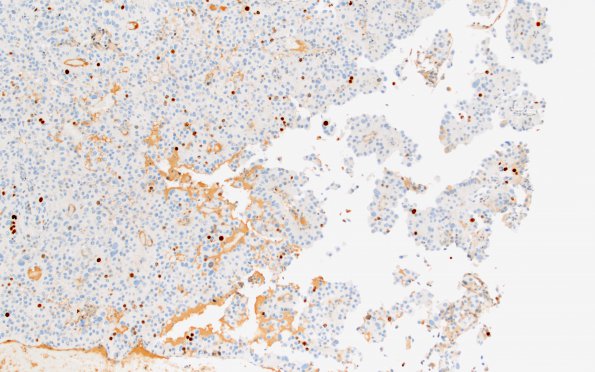Table of Contents
Washington University Experience | NEOPLASMS (MENINGIOMA) | Papillary | 3E Meningioma, papillary & rhabdoid (Case 3) Ki67 3
The Ki-67 proliferative index is moderate. ---- Ancillary studies (not shown):
Scattered tumor cells are positive with S-100 protein; a similar but less frequent pattern of staining is noted with synaptophysin and HMB-45. GFAP and S-100 both highlight gliotic but non-invaded brain. ---- FISH was performed at Washington University to assess the status of chromosomal arms 22q, 18p, 14q and 1p. Deletions of these arms are common in meningiomas, especially higher grade examples. In particular, 1p and 14q have been associated with atypical and anaplastic meningiomas as well as a higher risk of recurrence and shorter progression free survival. FISH probes to NF2 (22q12), BCR (22q11.2), DAL-1/4.1B (18p11.3), CEP18 (centromere 18), 14q32 and 1p32 were all employed. In this particular case, polysomies (i.e., gains) of chromosomes 1, 14, 18 and 22 are detected. This FISH pattern is considered non-specific. ---- Comment: The extended survival (~11 years) is unusual for an initially graded WHO grade III rhabdoid/papillary meningioma. Re-grading of this tumor would have designated it as a papillary meningioma, WHO Grade 2.

